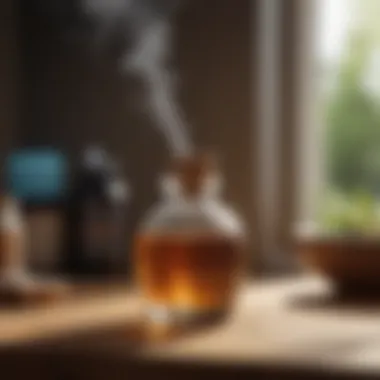Effective Strategies for Controlling and Preventing Sneezing Episodes


Well-Being Overview
Sneezing is a common bodily function that can be triggered by various factors such as allergies, irritants, or infections. Understanding how to effectively manage and prevent sneezing episodes is essential for improving overall well-being. By implementing practical methods and lifestyle adjustments, individuals can take control of their sneezing and enhance their quality of life.
Mental Health Matters
When it comes to managing sneezing episodes, mental health plays a crucial role. Stress and anxiety can exacerbate sneezing, so focusing on strategies to improve mental well-being is key. Coping mechanisms such as deep breathing exercises, meditation, and seeking professional support can help reduce the frequency of sneezing fits.
Physical Wellness
Incorporating regular exercise routines, maintaining healthy eating habits, and staying physically active are all integral aspects of preventing excessive sneezing. Exercise not only strengthens the immune system but also helps in reducing the body's reaction to allergens. A diet rich in immune-boosting nutrients like vitamin C and zinc can also contribute to a decrease in sneezing episodes.
Mindfulness & Self-Care Practices
Practicing mindfulness techniques can aid in reducing stress levels, which can, in turn, alleviate sneezing triggers. Engaging in self-care rituals such as relaxation exercises, aromatherapy, and setting aside time for personal rejuvenation can significantly impact sneezing frequency. Finding a balance between work responsibilities and relaxation is vital in managing sneezing episodes effectively.
Nutrition for Nourishment
Eating a balanced diet is fundamental in supporting overall health and combating sneezing triggers. Incorporating nutrient-rich foods such as leafy greens, citrus fruits, and lean proteins can bolster the immune system and reduce inflammation. Trying easy and healthy recipes that focus on natural, unprocessed ingredients is a practical way to optimize nutrition for sneeze prevention.
Sneezing, a natural reflex of the body, can be quite bothersome and disruptive to daily life. In this article, we delve into the intricacies of sneezing episodes and explore practical methods to control and prevent them effectively. Understanding the triggers, making lifestyle adjustments, and incorporating natural remedies are key components in combating excessive sneezing.
Given the prevalence of sneezing episodes and their impact on individuals' well-being, addressing this topic proves to be of utmost importance. Sneezing can be triggered by various factors such as allergic reactions, irritants in the environment, viral infections, or sudden changes in temperature. By diving deep into the causes and physiology of sneezing, we equip ourselves with the knowledge necessary to tackle this issue effectively.
Moreover, the preventative measures outlined in this article offer a holistic approach to reducing sneezing episodes. These measures include avoiding common triggers like pollen, dust, pet dander, strong odors, or pollutants in the air. By maintaining cleanliness in living spaces, utilizing air purifiers, practicing good personal hygiene, and adopting healthy lifestyle habits, individuals can significantly alleviate their susceptibility to frequent sneezing.
Home remedies play a crucial role in providing relief from sneezing. Techniques such as nasal irrigation through saline solutions, herbal teas like ginger or peppermint, and the use of humidifiers with essential oils contribute to soothing nasal passages and reducing the frequency of sneezing episodes.
When preventive measures and home remedies fall short, seeking medical intervention becomes necessary. Consulting healthcare professionals for allergy testing, prescription medications, or immunotherapy options can offer long-term solutions to persistent sneezing issues. In some cases, surgical procedures like nasal polyp removal or septoplasty may be recommended for chronic sneezing problems.
Understanding Sneezing
Understanding sneezing plays a pivotal role in this article's discourse. By delving into the causes and physiological aspects of sneezing, we can better comprehend how to effectively combat this natural bodily response. The relevance of understanding sneezing lies in its ability to help individuals identify triggers, implement preventive measures, and seek appropriate medical intervention when necessary. This section serves as the foundation for the entire narrative, laying the groundwork for practical solutions to alleviate sneezing episodes.
Causes of Sneezing


Allergic Reactions
In the realm of causes of sneezing, allergic reactions emerge as a prominent factor. Allergens in the environment can trigger sneezing episodes, prompting the body to expel irritants through this reflex action. The key characteristic of allergic reactions is their ability to hypersensitize the immune system, leading to symptoms like sneezing, itching, and congestion. While addressing allergic reactions in this article, we aim to shed light on the significance of avoiding allergens and seeking appropriate treatment to mitigate sneezing.
Irritants in the Environment
Irritants present in the environment also play a significant role in inducing sneezing. These irritants can range from pollutants to strong odors, eliciting a sneeze response as the body's defense mechanism. By exploring the impact of environmental irritants, we aim to underscore the importance of maintaining clean living spaces, using air purifiers, and practicing good hygiene to reduce exposure to these triggers.
Viral Infections
Viral infections, such as the common cold or flu, are notorious for causing bouts of sneezing. The key characteristic of viral infections is their ability to compromise the respiratory system, leading to inflammation and increased mucus production that triggers sneezing. By addressing viral infections in this article, we seek to emphasize the significance of practicing good hygiene, getting adequate rest, and boosting the immune system to fend off these pathogens.
Change in Temperature
A sudden change in temperature can also provoke sneezing in some individuals. This reaction is attributed to the body's adjustment to the new environmental conditions, which can stimulate the nasal passages and result in a sneeze reflex. Exploring the impact of temperature changes on sneezing allows us to highlight the importance of regulating indoor environments, dressing appropriately for weather fluctuations, and minimizing exposure to extreme temperatures.
Physiology of a Sneeze
Triggering of Nerve Endings
The process of a sneeze commences with the triggering of nerve endings in the nasal passages. When these nerve endings detect an irritant or foreign particle, they send signals to the brain, initiating the sneeze response. One key characteristic of this physiological mechanism is its rapid and involuntary nature, aiming to expel potential threats from the respiratory system promptly. By delving into the triggering of nerve endings, we uncover the body's intricate defense mechanisms against nasal irritants.
Involuntary Reflex Action
The act of sneezing is an involuntary reflex action controlled by the brainstem. Once the brain receives signals from the nerve endings, it coordinates a series of muscle contractions, culminating in the forceful expulsion of air and irritants from the nose and mouth. This reflex action serves as a protective response to rid the airways of potentially harmful substances, highlighting the body's innate mechanisms for safeguarding respiratory health.
Release of Air and Irritants
During a sneeze, the simultaneous release of air and irritants occurs at high velocity. This expulsion helps dislodge irritants lodged in the nasal passages or sinuses, promoting a cleaner respiratory environment. The key characteristic of this release mechanism is its efficiency in expelling foreign particles, providing immediate relief from nasal congestion and discomfort. By elucidating the release of air and irritants, we aim to underscore the body's innate ability to self-cleanse and maintain respiratory wellness.
Protective Mechanism
Sneezing serves as a protective mechanism to safeguard the respiratory tract from potential harm. By expelling irritants and clearing the nasal passages, sneezing plays a crucial role in maintaining optimal airway hygiene. The key characteristic of this protective mechanism is its swift and effective nature, preventing the infiltration of harmful substances deeper into the respiratory system. By exploring the intricacies of this protective function, we aim to underscore the body's innate defenses against airborne threats and the significance of supporting these mechanisms for overall well-being.
Preventive Measures


In the realm of combating excessive sneezing, preventive measures assume paramount significance in shielding oneself from unwarranted bouts of sneezing. These measures function as a proactive approach, aiming not only to address the symptoms but also to tackle the root causes underlying this common reaction. By delving into preventive measures, individuals can fortify their defenses against triggering elements that often induce sneezing episodes. Understanding the importance of preemptive strategies can profoundly impact one's overall well-being and quality of life. Through a meticulous examination of potential triggers and the implementation of preventive techniques, individuals can carve a path towards symptom alleviation and enhanced respiratory health.
Avoiding Triggers
- Pollen, Dust, and Pet Dander: Exploring the intricate relationship between environmental allergens like pollen, dust, and pet dander and their role in exacerbating sneezing tendencies unveils the necessity of vigilant avoidance. Characterized by their minuscule yet potent nature, these allergens pervade the air, triggering hypersensitive reactions in susceptible individuals. Identifying the distinctive characteristics of each allergen allows for tailored preventive measures, shielding individuals from inadvertent exposure and subsequent sneezing spells.
- Strong Odors or Perfumes: The pervasive influence of strong odors and perfumes on sneezing occurrences underscores the importance of olfactory hygiene in managing this reflex action effectively. Infused with volatile compounds that incite nasal irritation, strong odors can swiftly escalate sneezing fits in sensitive individuals. A nuanced understanding of odor-triggered reactions empowers individuals to navigate scent-heavy environments with caution, mitigating the likelihood of unwarranted sneezing episodes.
- Cold Air or Sudden Temperature Changes: Delving into the impact of sudden temperature shifts and cold air on nasal responses sheds light on the physiological reactions that underpin sneezing episodes. Harboring the potential to trigger nasal hypersensitivity, abrupt temperature changes prompt reflexive responses, including sneezing, in an effort to safeguard the respiratory system. By recognizing the influence of temperature on nasal reactivity, individuals can proactively mitigate these triggers, fostering respiratory comfort and well-being.
- Smoke and Air Pollution: Unpacking the detrimental effects of smoke and air pollution on respiratory health brings to the forefront the imperative of minimizing exposure to these airborne irritants. Laden with particulate matter and noxious fumes, smoke and air pollutants serve as potent instigators of respiratory distress, culminating in frequent bouts of sneezing. Embracing strategies to limit exposure to these pollutants holds the key to reducing sneezing incidents and safeguarding pulmonary function in vulnerable individuals.
Maintaining Cleanliness
- Regular Cleaning of Living Spaces: Embarking on a meticulous cleaning regimen for living spaces offers a formidable shield against the accumulation of allergens and irritants, pivotal in curbing sneezing triggers. By meticulously cleansing surfaces, vacuuming carpets, and purging indoor spaces of dust and debris, individuals can create a sanctum free from potential allergens, promoting respiratory ease and comfort. Emphasizing the indispensability of a clean environment underscores the significance of maintaining hygiene standards in preventing sneezing exacerbations.
- Use of Air Purifiers: Harnessing the purifying prowess of air purifiers accentuates the efficacy of preventive measures in combating airborne contaminants that precipitate sneezing episodes. Equipped with advanced filtration systems, air purifiers diligently remove microparticles, allergens, and pollutants from indoor air, purging the environment of potential triggers. Integrating air purifiers into living spaces represents a proactive step towards fostering a respiratory-friendly ambiance, minimizing sneezing triggers, and enhancing overall air quality.
- Washing Hands Frequently: Elevating hand hygiene to the forefront of preventive strategies amplifies the defense mechanism against external contaminants that often induce sneezing bouts. Regular hand washing serves as a fundamental practice in reducing pathogen transmission, curbing the influx of germs that can trigger nasal responses. By ingraining the habit of frequent hand washing, individuals fortify their immune defenses, mitigating the risk of falling prey to infectious agents that stimulate sneezing reflexes.
- Personal Hygiene Practices: Cultivating a holistic approach to personal hygiene underscores the pivotal role of individual cleanliness in preventing sneezing triggers and upholding respiratory wellness. From proper grooming routines to meticulous hygiene habits, the integration of comprehensive personal care practices fortifies the body's defenses against external contaminants. Prioritizing personal hygiene rituals contributes to a harmonious coexistence with one's environment, minimizing the occurrence of sneezing episodes and nurturing optimal well-being.
Healthy Lifestyle Habits
- Balanced Diet and Hydration: Nurturing the body with a balanced diet and adequate hydration instills a foundation of health that fortifies against sneezing inducers and sustains overall well-being. Embracing nutrient-rich foods and adequate water intake bolsters immune function, enhancing the body's resilience against allergens and irritants. The symbiotic relationship between dietary quality, hydration levels, and respiratory health underscores the significance of conscientious lifestyle choices in mitigating sneezing triggers and promoting vitality.
- Regular Exercise: Engaging in regular exercise regimes not only uplifts physical well-being but also augments immune defenses, shielding against potential sneezing instigators. The physiological benefits of exercise extend to respiratory health, amplifying lung capacity and promoting robust immune responses. By incorporating a consistent exercise regimen into daily routines, individuals cultivate resilience against environmental allergens, fostering respiratory strength and reducing susceptibility to sneezing stimuli.
- Adequate Sleep: Acknowledging the pivotal role of adequate sleep in bolstering immune function and enhancing overall health illuminates the essential link between restorative rest and sneezing prevention. Optimal sleep durations support the body's repair processes, optimize immune responses, and regulate inflammatory pathways, all integral in fortifying defenses against nasal irritants. Prioritizing restful sleep habits equips individuals with a formidable shield against sneezing triggers, nurturing holistic well-being and respiratory equilibrium.
- Stress Management: Delving into effective stress management strategies uncovers a transformative approach to curbing sneezing bouts and promoting respiratory tranquility. Chronic stress not only compromises immune function but also exacerbates allergic responses, heightening susceptibility to sneezing triggers. Embracing mindfulness practices, relaxation techniques, and stress-reducing activities empowers individuals with tools to combat stress-induced sneezing episodes, fostering emotional equilibrium and reinforcing respiratory resilience.
Home Remedies
In this insightful article focusing on effective ways to combat sneezing, home remedies take center stage as a crucial aspect of managing this common annoyance. Home remedies offer a natural and accessible approach to alleviating sneezing episodes, highlighting the importance of non-invasive methods to address this issue. By delving into home remedies, individuals can explore alternative treatments that are cost-effective and easy to incorporate into their daily routines, ensuring a holistic approach to combating sneezing triggers. With a plethora of benefits, home remedies underscore the significance of self-care and proactive health management in mitigating sneezing tendencies.
Nasal Irrigation
Saline Solution Rinse
When it comes to addressing sneezing, the saline solution rinse emerges as a standout approach with its gentle yet effective nature. This method involves flushing the nasal passages with a saline solution, helping to clear congestion, reduce irritants, and alleviate sneezing. The key characteristic of saline solution rinse lies in its ability to hydrate nasal passages without causing irritation, making it a popular choice among individuals seeking relief from sneezing. The unique feature of saline solution rinse is its simplicity and safety, providing a gentle solution for nasal cleansing that is suitable for individuals of all ages. Despite its efficacy in reducing sneezing episodes, potential disadvantages include temporary discomfort or mild stinging sensations among some users.
Neti Pot Usage
Another notable technique in nasal irrigation, neti pot usage, offers a traditional yet effective solution for managing sneezing triggers. By using a neti pot filled with a saline solution, individuals can irrigate their nasal passages, promoting mucus drainage and reducing nasal congestion. The key characteristic of neti pot usage lies in its ability to target specific areas of the nasal cavity, providing direct relief from irritants and allergens that contribute to sneezing. This popular choice for alleviating sneezing offers a natural and drug-free alternative, allowing individuals to take a proactive approach to nasal care. Despite its benefits, individuals should exercise caution with proper neti pot sterilization and use to avoid potential risks associated with improper nasal irrigation.
Steam Inhalation
In the realm of home remedies for sneezing, steam inhalation stands out as a soothing and beneficial practice for respiratory health. By inhaling steam from hot water, individuals can help open up congested airways, loosen mucus, and ease sneezing symptoms. The key characteristic of steam inhalation lies in its ability to provide instant relief for nasal congestion and irritation, offering a natural way to mitigate sneezing triggers. This popular choice for respiratory comfort offers a comforting and relaxing experience, allowing individuals to breathe easier and reduce sneezing frequency. Despite its advantages, individuals should be cautious with steam temperature to prevent burns or skin sensitivity, ensuring a safe and effective steam inhalation experience.
Herbal Teas and Warm Liquids
When exploring natural remedies for combating sneezing, herbal teas and warm liquids emerge as soothing and beneficial options to promote respiratory health. These comforting beverages offer a blend of warmth and herbal benefits that can help alleviate sneezing symptoms and enhance overall well-being. Whether opting for ginger tea, peppermint tea, or honey and lemon water, individuals can enjoy the unique flavors and therapeutic properties that these beverages provide. The key characteristic of herbal teas and warm liquids lies in their ability to offer hydration, immune support, and respiratory relief, making them popular choices for individuals seeking natural remedies for sneezing alleviation. Despite their advantages, individuals should be mindful of any potential allergies or sensitivities to specific ingredients in these beverages, ensuring a safe and enjoyable experience when incorporating herbal teas and warm liquids into their routine.


Humidifier and Essential Oils
As individuals navigate the realm of home remedies for sneezing, the use of a humidifier and essential oils emerges as a harmonious blend of moisture and aromatherapy to promote respiratory comfort. Moisturizing the air with a humidifier can help alleviate dryness and irritation in the nasal passages, reducing the likelihood of sneezing triggers. Essential oils such as eucalyptus and lavender offer additional benefits, including anti-inflammatory and soothing properties that can enhance the respiratory experience. The key characteristic of employing a humidifier and essential oils lies in their ability to create a conducive environment for respiratory health, supporting individuals in managing sneezing tendencies effectively. Despite their advantages, individuals should exercise caution with essential oil dilution and humidifier maintenance to prevent potential adverse effects, ensuring a safe and therapeutic atmosphere within their living spaces.
Medical Intervention
When it comes to addressing persistent sneezing episodes that may not be effectively managed by preventive measures or home remedies, medical intervention plays a crucial role. Seeking guidance from a healthcare professional can offer a deeper understanding of the underlying causes and the most suitable treatment options available. In this context, exploring medical interventions becomes imperative to alleviate symptoms and enhance overall well-being.
Consulting a Healthcare Professional
Allergy Testing
In the realm of managing sneezing, allergy testing emerges as a pivotal tool. This diagnostic procedure aims to pinpoint specific allergens triggering the sneezing reflex. By identifying these allergens, individuals can tailor their environment and lifestyle to minimize exposure, thereby reducing the frequency of sneezing episodes. The comprehensive nature of allergy testing enables targeted interventions, making it a preferred choice in combating sneezing triggers.
Prescription Medications
Prescription medications stand out as a valuable resource in managing sneezing for individuals with severe or persistent symptoms. These medications, ranging from antihistamines to corticosteroids, work to control allergic responses or reduce inflammation in the nasal passages, providing much-needed relief. While prescription medications offer efficacy in symptom management, they may also pose side effects or contraindications, emphasizing the importance of medical supervision and adherence to prescribed dosages.
Immunotherapy Options
For individuals seeking a long-term solution to sneezing triggers, immunotherapy presents a compelling option. This treatment involves desensitizing the immune system to specific allergens through regular injections or oral doses. By gradually exposing the body to allergens in controlled amounts, immunotherapy aims to reduce allergic reactions, including sneezing, over time. While immunotherapy requires commitment and patience due to its gradual effectiveness, the potential for lasting symptom relief makes it a valuable consideration for persistent sneezing.
Surgical Procedures
Nasal Polyp Removal
In cases where nasal polyps contribute to frequent sneezing and nasal congestion, surgical removal becomes a viable intervention. This procedure aims to eliminate the obstructive nasal growths, restoring proper airflow and reducing sneezing episodes. The clarity of nasal passages post-surgery enhances breathing quality and diminishes the triggers for sneezing, promoting overall respiratory health.
Septoplasty for Deviated Septum
Addressing a deviated septum through septoplasty offers a lasting solution for individuals experiencing chronic sneezing due to nasal structural issues. By realigning the nasal septum, airflow becomes optimized, reducing nasal irritation and consequent sneezing. Septoplasty's effectiveness in correcting nasal abnormalities underscores its significance in providing sustained relief from sneezing episodes and improving nasal function.
Conclusion
In the realm of battling incessant sneezing, the clarion call for a nuanced conclusion reverberates with resounding importance. This denouement serves as the zenith of our discourse, encapsulating a plethora of intertwined salient elements that harmonize within the tapestry of this comprehensive article on thwarting sneezing fits effectively. The significance of the conclusion lies in its ability to distill multifaceted insights and proffer practical takeaways that resonate with our astute readership comprising health professionals, wellness coaches, nutritionists, fitness trainers, and mindfulness instructors.
As we navigate through the labyrinth of strategies delineated throughout this scholarly expedition, the denouement acts as the compass, guiding us towards a holistic understanding of combating sneezing spasms. It underlines the efficacy of a multifaceted approach encapsulating preventive measures, home remedies, and medical interventions, each etched with meticulous details to empower individuals with the arsenal required to stymie sneezing commotions robustly.
Lucidity and coherence permeate the essence of this conclusion, crystallizing the imperative to discern triggers, maintain a pristine environment, embrace healthy lifestyle habits, and explore the realm of home remedies and medical consultations as pivotal pillars of combating sneezing. Ascending intricately from the depths of understanding sneezing triggers to the apex of formulating a personalized battle plan against this niggling nuisance, the conclusion consolidates the embossed relevance of each stratagem expounded herein.
Part innately diagnostic and part prescriptive, the conclusion not only elucidates the elucidative wisdom garnered from dissecting the nuances of sneezing triggers but also furnishes a roadmap to foster enduring lifestyle modifications that resonate with the exigencies of our vibrant readership. An amalgamation of insights drawn from empirical research and anecdotal testimonies converge within the confines of this conclusion, abridging the chasm between theory and practical application to engender a transformative narrative encapsulating the conquest of sneezing spells with panache.



